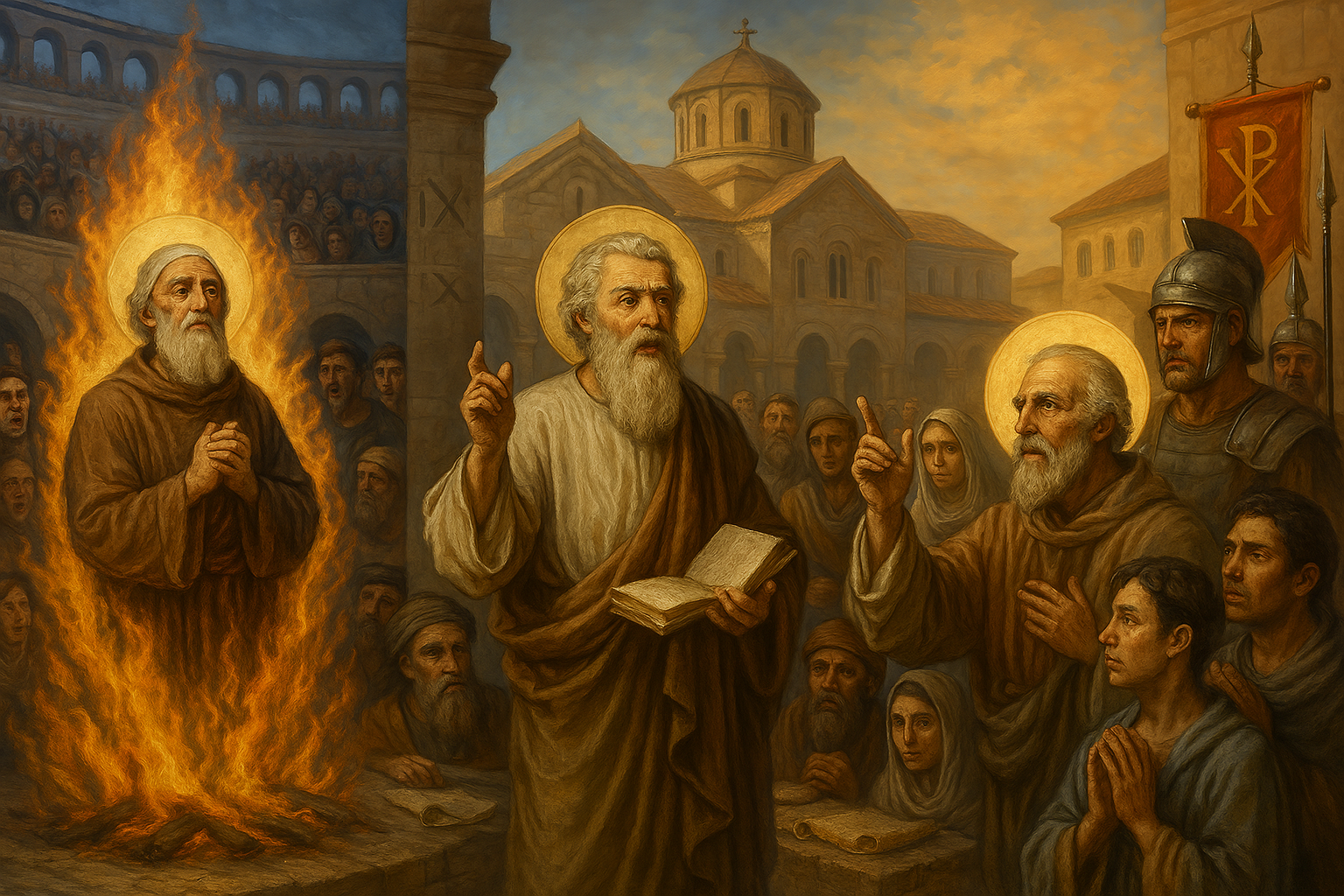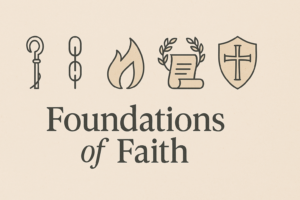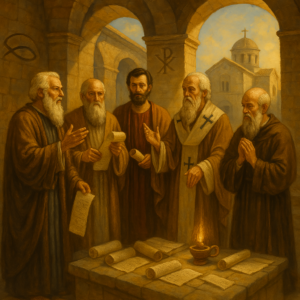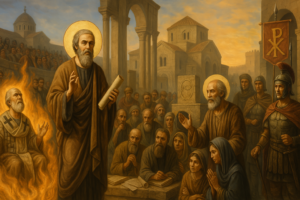Estimated reading time: 15 minutes
Key Takeaways
- The early church fathers were instrumental in shaping Christian doctrine and practice.
- Their writings addressed challenges like heresies, persecution, and explaining faith to new cultures.
- Major figures include Ignatius of Antioch, Polycarp of Smyrna, Irenaeus, and others.
- Their insights remain relevant for understanding and inspiring modern faith.
- Studying their works offers valuable perspectives on the development of Christian theology.
Introduction to Early Church Fathers
The early church fathers were remarkable Christian thinkers, writers, and leaders who lived during the post-Apostolic age. These influential figures helped shape Christian doctrine and establish the foundation of the Church as we know it today. Living between the late first and eighth centuries AD, they stood as bridges between the apostles themselves and later generations of believers.
These spiritual giants played crucial roles in:
- Defending the faith against various heresies
- Interpreting Scripture for new believers
- Establishing church traditions and practices
- Articulating complex theological concepts in understandable ways
Their writings and teachings continue to influence Christianity across all denominations. From Clement of Rome to Augustine of Hippo, these early church fathers provided critical insights that help us understand the historical development of Christian theology and practice.
This exploration will dive into their fascinating history, examine their most important writings, and uncover how their timeless wisdom can inspire and strengthen modern faith.
Historical Context of Early Church Fathers History
The early church fathers’ history spans several centuries and represents a critical period when Christianity transitioned from a small movement to a significant religious force. This era can be divided into four key periods:
Apostolic Age (1st century AD):
- The earliest church fathers, called apostolic church fathers, were contemporaries of the original apostles
- They likely received direct teaching from those who walked with Jesus
- Key figures include Clement of Rome, Ignatius of Antioch, and Polycarp of Smyrna
Ante-Nicene Period (2nd-3rd centuries):
- Christianity spread throughout the Roman Empire despite persecution
- Fathers like Justin Martyr, Irenaeus, and Tertullian defended the faith
- Apostolic fathers’ writings became increasingly important for maintaining doctrinal purity
Nicene Period (4th century):
- Emperor Constantine legalized Christianity, ending major persecutions
- The Council of Nicaea (325 AD) addressed key theological disputes
- Figures like Athanasius and the Cappadocian Fathers refined trinitarian theology
Post-Nicene Period (5th-8th centuries):
- The Church expanded its influence throughout the known world
- Augustine, Jerome, and others produced influential theological works
- Christian doctrine became more systematized and formalized
These pioneering believers faced tremendous challenges—persecution from authorities, internal doctrinal disputes, and the daunting task of explaining Christian concepts to cultures steeped in paganism. Their perseverance and intellectual rigor helped establish Christianity’s theological foundation that has endured for two millennia.
Learn more about the early church fathers here.
Major Early Church Fathers and Their Writings
Saint Ignatius of Antioch
Saint Ignatius of Antioch stands as one of the most revered early church leaders. As the third bishop of Antioch in Syria, he provided crucial leadership during a formative period in church history. His impact is especially remarkable considering that most of his surviving writings were composed during his final journey to Rome, where he would face martyrdom around 110 AD.
Ignatius of Antioch’s writings consist of seven authentic letters addressed to various churches while being transported as a prisoner. These letters reveal several key themes:
- The importance of church unity under the authority of bishops
- Warnings against heretical teachings, particularly docetism (belief that Christ only seemed human)
- The centrality of the Eucharist in Christian worship
- The value of martyrdom as witness to Christian faith
His famous quote, “I am the wheat of God, and let me be ground by the teeth of the wild beasts, that I may be found the pure bread of Christ,” exemplifies his devotion and willingness to sacrifice for his faith.
Discover more about Ignatius of Antioch here.
Polycarp of Smyrna Writings
Polycarp of Smyrna holds a special place among the apostolic fathers as a direct disciple of the Apostle John. His connection to the apostolic era makes his writings particularly valuable for understanding early Christian teaching. Born around 69 AD, he served as bishop of Smyrna (modern Izmir, Turkey) until his martyrdom around 155 AD at approximately 86 years old.
The Polycarp of Smyrna writings that survive include:
- His Letter to the Philippians – The only authentic document we have from his hand
- The Martyrdom of Polycarp – Written by the church of Smyrna after his death
These documents show Polycarp’s:
- Deep knowledge of apostolic teachings
- Commitment to preserving orthodox doctrine
- Courage in the face of persecution
- Practical pastoral guidance for early believers
His martyrdom account is one of the earliest such documents outside the New Testament and established a model for how Christians viewed sacrificial death for faith. When urged to renounce Christ, Polycarp famously replied, “Eighty-six years I have served Christ, and He never did me any wrong. How can I blaspheme my King who saved me?“
Read more about Polycarp’s writings here.
Irenaeus Writings
Irenaeus of Lyons emerged as a towering theological figure in the late second century. As bishop of Lugdunum in Gaul (modern Lyon, France), he provided critical responses to dangerous heresies threatening the young church. His connection to apostolic teaching came through Polycarp, linking him to the Apostle John’s tradition.
The most significant Irenaeus writing is his five-volume work “Against Heresies” (Adversus Haereses), written around 180 AD. This comprehensive response to Gnosticism:
- Systematically exposed and refuted Gnostic teachings
- Defended the unity of God in both Old and New Testaments
- Established the fourfold Gospel (Matthew, Mark, Luke, John) as authoritative
- Outlined the concept of apostolic succession to preserve true doctrine
Irenaeus against heresies was groundbreaking in its approach, using the Gnostics’ own arguments against them while presenting positive articulations of orthodox Christian belief. His other significant work, “Demonstration of Apostolic Preaching,” provides a summary of Christian teaching intended for new converts.
What makes Irenaeus particularly valuable is his balanced approach to theology, Scripture, and tradition. He emphasized that true Christianity is marked by consistency with apostolic teaching, providing an early benchmark for evaluating theological claims.
Learn more about Irenaeus here.
St Justin Martyr
St Justin Martyr stands as Christianity’s first great apologist—a defender of the faith who engaged directly with the philosophical traditions of his time. Born around 100 AD in Samaria to pagan parents, Justin’s search for truth led him through various philosophical schools before encountering Christianity, which he described as “the only safe and profitable philosophy.”
The Justin Martyr writings that survive include:
- First Apology – Addressed to Emperor Antoninus Pius around 155 AD
- Second Apology – A shorter sequel to his first defense
- Dialogue with Trypho – A recorded debate with a Jewish scholar about Christianity
What makes Justin unique is his approach to defending Christianity:
- He used Greek philosophical concepts to explain Christian doctrines
- He presented Christianity as the fulfillment of the best in pagan philosophy
- He provided some of our earliest descriptions of Christian worship practices
- He argued for the moral superiority of Christian living
Justin’s description of early Christian worship, including Sunday gatherings and baptism, offers invaluable historical insights. He wrote, “On the day called Sunday, all who live in cities or in the country gather together to one place,” and proceeded to describe a service remarkably similar to modern Christian worship.
Justin was eventually beheaded in Rome around 165 AD for refusing to sacrifice to pagan gods, embodying his own teaching that Christians should be willing to die rather than compromise their faith.
Find out more about Justin Martyr here.
Tertullian and Origen
Tertullian and Origen represent two of the most brilliant early Christian minds, though each took theology in significantly different directions. Both lived during the late second and early third centuries, a time when Christianity faced intense persecution and intellectual challenges.
Tertullian (155-220 AD) was the first major Christian writer to produce a substantial body of work in Latin rather than Greek. Born in Carthage (modern Tunisia), he began as a pagan lawyer before converting to Christianity around 197 AD. His contributions include:
- Coining key theological terms like “Trinity” and “person”
- Developing early forms of Western theology
- Writing powerful apologetic works defending Christians against false accusations
- Creating the famous phrase “the blood of martyrs is the seed of the Church“
Tertullian’s legal background appears in his precise, forceful arguments, though in later life he joined the Montanist movement, considered somewhat unorthodox.
Origen (185-254 AD) was a biblical scholar, theologian, and spiritual writer from Alexandria, Egypt. His vast output (reportedly over 2,000 works) includes:
- The Hexapla – A massive textual comparison of Old Testament translations
- On First Principles – An early systematic theology
- Against Celsus – A defense of Christianity against pagan criticism
- Extensive biblical commentaries using allegorical interpretation
Origen’s approach to Scripture pioneered multiple layers of meaning: literal, moral, and spiritual. While his allegorical method sometimes led to speculative theology, his influence on biblical interpretation remains significant.
Both men faced controversy—Tertullian for his Montanist sympathies and Origen for some speculative theological positions later questioned by the Church. Nevertheless, their intellectual contributions helped Christianity articulate its beliefs with greater precision and depth.
Read about Tertullian and Origen here.
Other Notable Early Christian Fathers
Beyond the figures already discussed, several other early Christian fathers made profound contributions to theology and church practice. These influential leaders helped to refine doctrine, defend orthodoxy, and guide the church through periods of persecution and transition.
The Cappadocian Fathers included three theologians from Cappadocia (modern Turkey) who profoundly shaped trinitarian doctrine:
- Basil the Great (330-379) – Reformed monasticism and clarified the doctrine of the Holy Spirit
- Gregory of Nazianzus (329-389) – Known as “The Theologian” for his eloquent writings on the Trinity
- Gregory of Nyssa (335-395) – A mystical theologian who developed spiritual theology
Augustine of Hippo (354-430) stands as perhaps the most influential Western church father. His numerous writings include:
- Confessions – His spiritual autobiography
- City of God – A Christian philosophy of history
- Works on grace, free will, and predestination
Ambrose of Milan (339-397) served as bishop of Milan and influenced Augustine’s conversion. He:
- Defended church independence from imperial control
- Developed Christian ethics for public officials
- Composed hymns still sung today
John Chrysostom (347-407), Archbishop of Constantinople, was renowned for his:
- Eloquent preaching (his name means “golden-mouthed”)
- Rich biblical commentaries
- Advocacy for the poor
- Moral courage in confronting corruption
Jerome (347-420) translated the Bible into Latin (the Vulgate) and produced important biblical commentaries.
Athanasius (296-373) defended the divinity of Christ against Arianism and influenced the Nicene Creed.
These early Christian fathers faced diverse challenges—from external persecution to internal doctrinal disputes—yet their collective wisdom established theological foundations that continue to guide Christians today. Their writings reflect deep biblical knowledge, pastoral sensitivity, and intellectual rigor applied to understanding and explaining Christian faith.
Explore more about the church fathers here.
Early Christian Writings and Their Impact
Early Christian writings represent a treasure trove of spiritual and theological insight from Christianity’s formative years. These documents—spanning from the late first century through the eighth century—reveal how early believers understood, practiced, and defended their faith in challenging circumstances.
These writings took various forms:
- Epistles – Letters addressing specific church situations or doctrinal questions
- Apologies – Defenses of Christianity against pagan accusations
- Homilies – Sermons explaining Scripture and Christian doctrine
- Treatises – Systematic explorations of theological topics
- Martyrologies – Accounts of Christians’ faithful deaths
- Church manuals – Guidelines for worship and community life
The apostolic fathers’ writings are particularly significant as the earliest Christian documents outside the New Testament. These include:
- The Didache – An early church manual on ethics, rituals, and church organization
- 1 Clement – A letter from Rome to the Corinthian church addressing disunity
- The Shepherd of Hermas – An apocalyptic work focused on repentance and morality
- Letters of Ignatius – Seven epistles from the bishop of Antioch
- Polycarp’s Letter to the Philippians – Pastoral guidance emphasizing apostolic teaching
What makes these writings valuable is their:
- Proximity to the apostolic era
- Insights into early worship practices and church structure
- Documentation of how Christians interpreted Scripture
- Record of responses to the first major theological controversies
- Demonstration of Christianity’s spread across diverse cultures
Today, early church fathers online resources have made these writings more accessible than ever. Digital archives, searchable databases, and translations into modern languages allow contemporary Christians to engage with these ancient texts directly. Websites like the Christian Classics Ethereal Library, Early Christian Writings, and New Advent provide free access to most major patristic works.
These resources enable believers to trace the development of Christian thought, discover the historical contexts of biblical interpretation, and find spiritual wisdom tested by time.
Learn about the impact of early Christian writings here.
Formation of Christian Doctrine
The formation of Christian doctrine was not a single event but a centuries-long process guided by the early church fathers. This development was not about creating new beliefs but articulating, defining, and defending the faith delivered by Christ and the apostles as new questions and challenges arose.
Several factors drove the formation of Christian doctrine:
- Response to heresies – Many doctrinal statements were formed to counter false teachings
- Intellectual inquiry – Christians sought to understand their faith more deeply
- Practical needs – Communities needed guidance on worship, ethics, and organization
- Cultural adaptation – The gospel needed expression in different linguistic and philosophical frameworks
This doctrinal development followed a pattern:
- Implicit belief – Faith practiced based on apostolic teaching
- Challenges arise – Questions or controversies emerge
- Theological reflection – Church leaders examine Scripture and tradition
- Formal articulation – Councils or influential teachers provide authoritative statements
- Reception – The wider church accepts these formulations as faithful expressions of apostolic teaching
Key doctrinal developments included:
- The nature of Christ – Defining Jesus as fully divine and fully human
- Trinity – Articulating the relationship between Father, Son, and Holy Spirit
- Scripture – Determining which books belonged in the biblical canon
- Salvation – Understanding how humans are reconciled to God
- Church – Defining the nature and authority of the Christian community
The formation of Christian doctrine was not about innovation but clarification. As Irenaeus wrote, the church “carefully preserves” the apostolic faith, “as if she were dwelling in one house,” despite being spread throughout the world.
This process demonstrates how Christianity maintained continuity with its origins while addressing new questions that emerged as the faith spread across diverse cultures and generations.
Understand more about the formation of doctrine here.
Nicene Creed Significance
The Nicene Creed stands as perhaps the most important doctrinal statement in Christian history. Created at the Council of Nicaea in 325 AD and refined at the Council of Constantinople in 381 AD, this creed represents a watershed moment in the formation of Christian doctrine.
The Council of Nicaea was convened by Emperor Constantine to address a theological controversy that threatened to divide the church. The primary issue concerned the relationship between God the Father and Jesus Christ. Arius, a priest from Alexandria, taught that Jesus was a created being—divine but not of the same substance as God the Father. Alexander, bishop of Alexandria, and his successor Athanasius argued that Jesus shared the same divine essence as the Father.
The significance of the Nicene Creed includes:
- Trinitarian orthodoxy – It clearly affirmed the full divinity of Christ against Arianism
- Doctrinal unity – It provided a common statement of faith across the Christian world
- Liturgical use – It became central to worship, reinforcing core beliefs
- Theological precision – It employed careful language to articulate complex concepts
- Ongoing authority – It continues to be accepted by Catholic, Orthodox, and most Protestant churches today
The creed’s famous lines about Jesus—”begotten, not made, being of one substance with the Father“—directly countered Arian teaching by establishing that Jesus was not a created being but eternally divine.
The early church fathers’ beliefs about Christ’s divinity, expressed in the creed, were not mere abstract theology but central to Christian salvation. As Gregory of Nazianzus wrote: “What has not been assumed has not been healed.” If Christ were not fully divine, he could not reconcile humanity to God.
The Nicene Creed represents the church’s commitment to preserve essential truth about God’s nature while providing believers with language to express their faith accurately. Its enduring use across Christian traditions for nearly 1,700 years demonstrates its profound significance in articulating core Christian beliefs.
Learn about the Nicene Creed’s significance here.
Early Church Fathers on the Trinity
The doctrine of the Trinity—one God existing eternally as three distinct persons: Father, Son, and Holy Spirit—was not fully articulated in the earliest days of Christianity. The early church fathers played a crucial role in developing this central Christian teaching through several centuries of theological reflection.
The journey toward trinitarian understanding progressed through several stages:
First and Second Centuries:
- Early Christian writings used trinitarian language in baptismal formulas and doxologies
- Justin Martyr described worship offered to Father, Son, and Holy Spirit
- Irenaeus spoke of the Son and Spirit as the “hands of God”
- Tertullian first used the Latin term “trinitas” (trinity) around 200 AD
Third Century:
- Origen developed more systematic reflection on eternal relations within the Trinity
- Debates intensified about how to understand Christ’s relationship to the Father
- Questions about the Holy Spirit’s nature became more prominent
Fourth Century:
- The Arian controversy erupted over Christ’s divinity
- The Council of Nicaea (325) affirmed Christ’s full divinity
- The Cappadocian Fathers refined trinitarian language
- The Council of Constantinople (381) affirmed the Holy Spirit’s divinity
The early fathers faced significant challenges in expressing trinitarian doctrine:
- Using philosophical language adequate to express biblical revelation
- Maintaining monotheism while affirming three distinct persons
- Avoiding analogies that might suggest three gods or diminish the persons
- Explaining this mystery in terms accessible to ordinary believers
Gregory of Nazianzus captured this challenge: “I cannot think of the One without being immediately surrounded by the splendor of the Three; nor can I distinguish the Three without being immediately carried back to the One.“
The fathers also emphasized the resurrection as the ultimate validation of Christ’s identity. As Athanasius wrote, the resurrection proved Christ was “very God of very God,” not merely a created being. This resurrection faith formed the foundation of trinitarian worship, where believers experienced communion with Father, Son, and Holy Spirit.
The early church fathers on the Trinity demonstrate how Christian doctrine developed—not by adding new ideas, but by finding clearer ways to express the faith received from the apostles.
Read more about the development of the Trinity doctrine here.
Frequently Asked Questions
Who were the early church fathers?
The early church fathers were Christian leaders, theologians, and writers from the first to eighth centuries who shaped Christian doctrine and practice. They played crucial roles in defending the faith, interpreting Scripture, and establishing church traditions.
Why are the writings of the church fathers important?
The writings provide insights into early Christian beliefs, practices, and responses to challenges. They help us understand how doctrine developed and offer wisdom that continues to inform and inspire modern faith.
How can I access early church fathers’ writings?
Many writings are available online through resources like the Christian Classics Ethereal Library, Early Christian Writings, and New Advent. These sites offer translations and commentaries for free.
What was the role of the Nicene Creed?
The Nicene Creed was formulated to address the Arian controversy and affirm the full divinity of Jesus Christ. It served to unify Christian doctrine and remains a central statement of faith in many Christian traditions.
How did the early church fathers influence modern Christianity?
Their theological reflections, doctrinal clarifications, and spiritual insights laid the foundations for many aspects of modern Christian belief and practice. Their works continue to be studied for guidance and inspiration.




